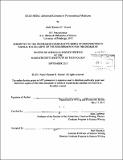SIGN HERE : informed consent in personalized medicine
Author(s)
Ahmed, Abdul-Kareem H
DownloadFull printable version (1.762Mb)
Alternative title
Informed consent in personalized medicine
Other Contributors
Massachusetts Institute of Technology. Department of Comparative Media Studies.
Advisor
Alan Lightman.
Terms of use
Metadata
Show full item recordAbstract
The next era of medicine will be one of personalization, scientists and physicians promise. Personalized medicine is a refined clinical approach in which clinicians will utilize your genomic information to help you prevent disease, and tailor targeted therapies for you when you fall ill. This is the future science has slowly been approaching. However, the human genome is not enough, not unless we can decipher its language. One ambitious study to this effect is the Personal Genome Project, led by Dr. George Church at Harvard Medical School. This project will eventually recruit 100,000 volunteers to donate their genomes and a full body of information concerning their biological health. With this data, Church hopes others can cross-analyze these profiles and better determine the role in disease of each gene of the human genome. However, the Personal Genome Project is as much a study in the ethical, legal and social aspects of genomic studies as it is an effort toward personalized medicine. Church envisions a future where privacy cannot be guaranteed. Society is becoming more open and technology is more invasive than ever. Considering this, Church has informed his participants that their information will likely not remain anonymous. With their fully informed consent, he has in turn made all this data public, to promote open science. This ethical approach raises several important questions about expansive genomic studies. The scientific community will have to decide on an approach that will eventually deliver personalized medicine. On one end of the spectrum, there is Church's open approach, and the other, more security, more firewalls and more legislation. In order for personalized medicine to become a reality, society will have to prepare itself for our ever-changing ethical, technological and scientific landscape.
Description
Thesis (S.M. in Science Writing)--Massachusetts Institute of Technology, Dept. of Comparative Media Studies, 2013. Vita. Cataloged from PDF version of thesis. Includes bibliographical references (pages 27-30).
Date issued
2013Department
Massachusetts Institute of Technology. Program in Comparative Media Studies/WritingPublisher
Massachusetts Institute of Technology
Keywords
Comparative Media Studies.